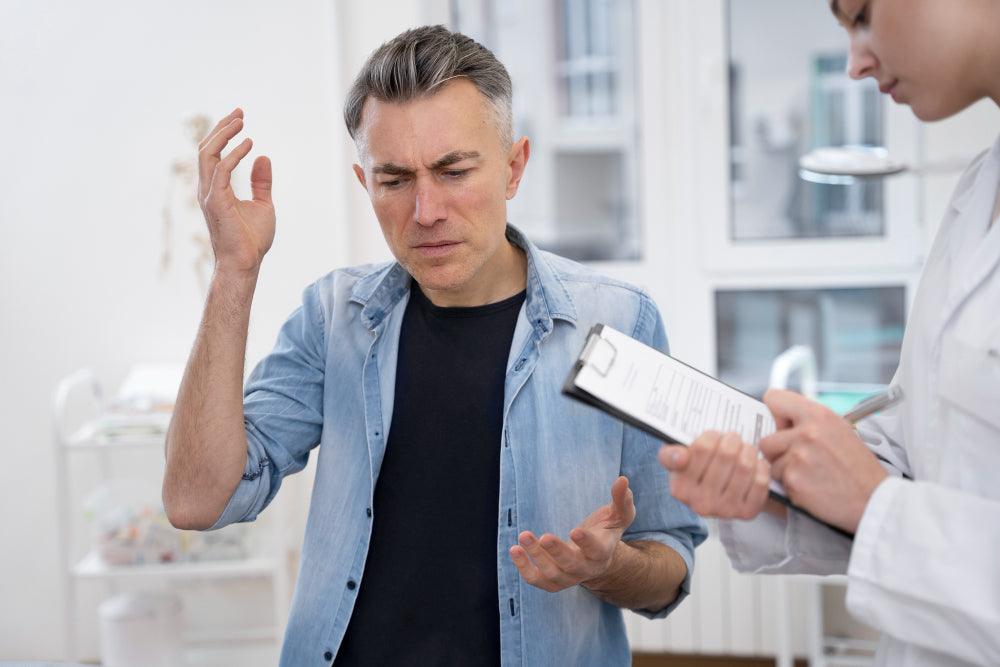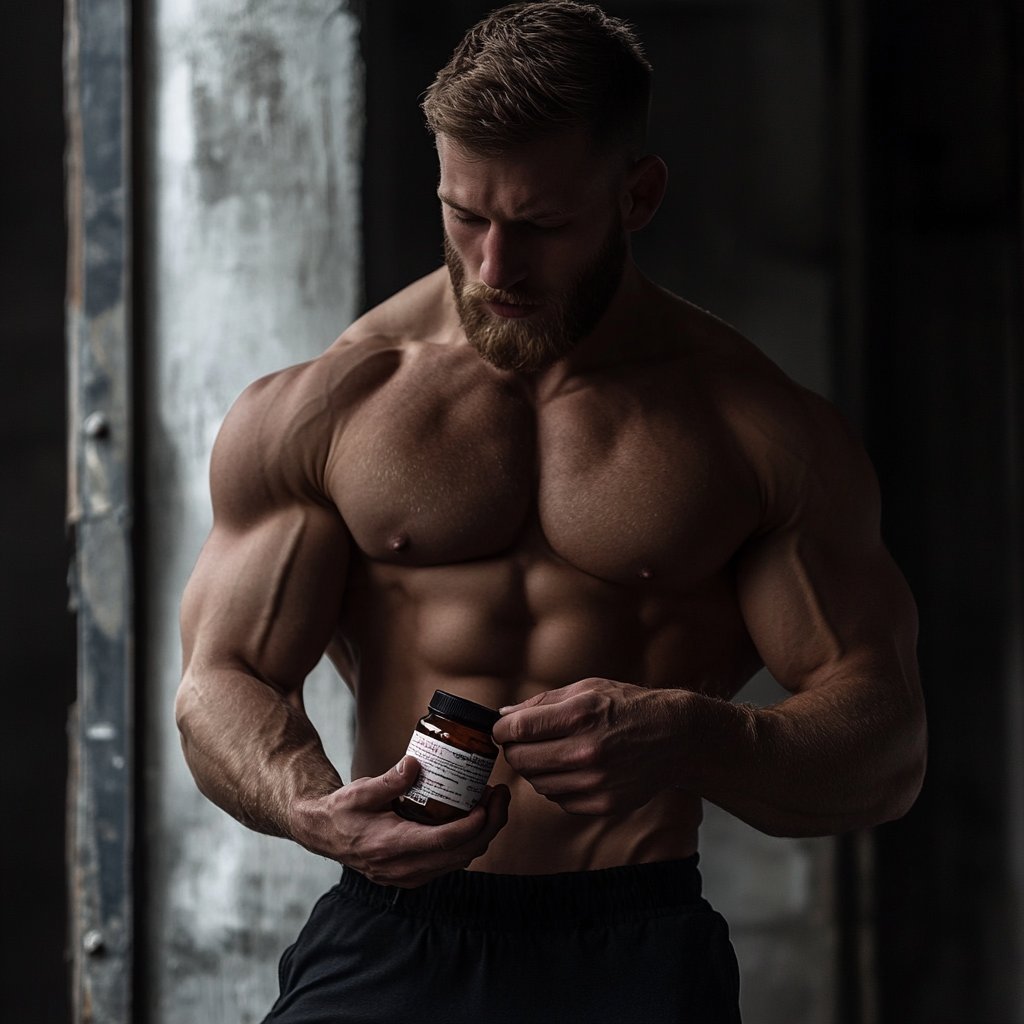
 Instagram
Instagram
Related products
Low Testosterone Levels in Men: Symptoms, Causes, Tests & Treatments

Related products
Symptoms of Low Testosterone Levels in Men
Physical symptoms (fatigue, weight gain, decreased muscle mass)
Low testosterone levels in men can manifest in various physical symptoms that can profoundly affect daily life. Fatigue is one of the most noticeable symptoms. Men suffering from low testosterone often report feeling persistently tired and drained, even after a full night's sleep. This isn't the normal tiredness that comes after a long day but a fatigue that doesn't seem to lift. "The fatigue associated with low testosterone is often debilitating, hindering daily activities and overall quality of life" states Dr. Samantha Clarke. Weight gain, particularly around the abdominal area, is another significant symptom. The body's ability to regulate fat distribution is influenced by testosterone, and when levels are low, men may notice an unexplained increase in body fat. This weight gain is often resistant to typical weight loss methods and can be very frustrating. Decreased muscle mass is also a common physical symptom. Men might find that despite regular exercise, their muscles are shrinking or not responding to workouts. Some might even notice physical weakness. For example, a 40-year-old man named Thomas from Birmingham shared his experience of losing muscle mass: "I was hitting the gym regularly, but my muscles just seemed to shrink. It was like no amount of weightlifting made a difference. "Around 20% of men over the age of 50 in the UK experience these physical symptoms due to low testosterone. This statistic illustrates the importance of recognizing and addressing this condition" a study published in British Journal of Endocrinology.
Emotional and mental symptoms (mood swings, depression)
Low testosterone levels can also profoundly affect emotional well-being. Mood swings, irritability, and a general sense of unhappiness may pervade a man's daily life. "Men with low testosterone often describe a cloud that just won't lift. They feel down, irritable, and sometimes even fall into depression" explains Dr. Rebecca Hall. A concrete example of this emotional toll can be seen in a patient's story from Leeds. James, a 45-year-old father, explained how his mood swings became so severe that it started to affect his family life: "I would snap at my kids for no reason and feel miserable all the time. I didn't know what was wrong with me." Depression is not uncommon in men with low testosterone. What starts as mood swings and irritability can evolve into a more serious mental health condition. In the UK, an estimated 5% of men with low testosterone are diagnosed with clinical depression, a condition that requires professional medical treatment" says National Health Service, UK. These emotional and mental symptoms, although invisible, are no less real and can be even more challenging to manage than the physical symptoms. They impact relationships, work performance, and overall happiness. Treatment and support are vital to help men regain control over their emotional lives.
Sexual symptoms (low libido, erectile dysfunction)
Sexual symptoms associated with low testosterone levels often have the most immediate and distressing impact on men. Low libido or a decreased interest in sexual activity is common. This symptom can create tension in intimate relationships and lead to feelings of inadequacy. Erectile dysfunction is another troubling symptom. While it's a complex issue with many potential causes, low testosterone can be a significant factor. "Low testosterone levels can disrupt the body's ability to respond to sexual arousal, leading to difficulties with erections. This is a treatable condition, but it requires proper diagnosis and care" states Dr. Matthew Harris. Examples of men struggling with these symptoms are not hard to find. A support group in Bristol shares stories of men grappling with the loss of sexual function and its impact on their relationships. One man, Richard, a 55-year-old from Bristol, spoke about how erectile dysfunction almost ended his marriage: "It wasn't just the sex; it was the connection with my wife that suffered. I felt less of a man." These sexual symptoms are more than mere inconveniences; they can lead to profound relationship difficulties and personal distress. A survey found that 15% of men experiencing these symptoms felt it significantly impaired their relationships states Men's Health UK. The range of symptoms—physical, emotional, and sexual—underscores the complexity of low testosterone in men. Recognizing these symptoms and seeking professional help is the first step towards restoring health, well-being, and quality of life in the UK.
What Causes Low Testosterone Levels in Men?
Age-related decline
One of the primary causes of low testosterone levels in men is the natural decline associated with ageing. Testosterone levels peak in early adulthood and then gradually decrease about 1% per year after the age of 30. "This decline is normal and usually gradual, but in some men, it can lead to symptoms that require attention" explains Dr. Oliver Turner, a leading endocrinologist. A well-known study conducted in the UK in 2017 found that nearly 30% of men over 60 experience low testosterone levels. This age-related decline is not just a number; it affects everyday lives, relationships, and overall health in older men.
Underlying health conditions (hypothyroidism, liver disease)
Low testosterone can also result from underlying health conditions such as hypothyroidism and liver disease. Hypothyroidism, a condition where the thyroid gland doesn't produce enough hormones, can negatively affect testosterone production. "The complex hormonal balance in our body means that a problem in one area, like the thyroid, can have cascading effects elsewhere, such as testosterone levels" says Dr. Emily Roberts. Liver disease is another medical condition that can cause low testosterone. The liver plays a vital role in metabolizing testosterone, and chronic liver problems can disrupt this process. For instance, John, a 52-year-old patient from Glasgow with liver disease, experienced severe low testosterone symptoms that were later linked to his liver condition. His case emphasizes the need for comprehensive medical evaluation when symptoms arise.
Lifestyle factors (diet, lack of exercise)
Lifestyle choices play a significant role in testosterone levels. A poor diet lacking essential nutrients and physical inactivity can contribute to low testosterone. "Men who consume a diet high in processed foods and low in essential fats, vitamins, and minerals may see a decrease in testosterone" says a nutritionist Sarah James). A sedentary lifestyle, common in modern urban living, can also contribute to this condition. For example, Mark, a 35-year-old office worker in London, discovered that his low testosterone was partly due to his sedentary job and lack of exercise. After making positive lifestyle changes, he noticed a considerable improvement in his symptoms.
Genetic factors
Sometimes, low testosterone levels are linked to genetic factors. Certain genetic conditions can lead to lower production of this hormone. "Conditions such as Klinefelter syndrome can cause low testosterone from birth, but even more subtle genetic variations can affect testosterone levels later in life", says Dr. Katherine Lewis, a geneticist from UK. Families like the Thompsons from Newcastle have multiple members affected by low testosterone, pointing to a possible genetic link. Their story emphasizes the importance of understanding family medical history and seeking appropriate medical care when needed.
How Are Low Testosterone Levels Diagnosed?
Medical history and physical examination
Diagnosing low testosterone is a multi-step process that begins with a thorough medical history and physical examination. Healthcare professionals will ask about symptoms, lifestyle, family history, and perform a physical exam. Understanding a patient's medical history and performing a detailed physical exam often gives us the first clues about low testosterone. It's a vital step in the diagnostic process.

Buy your Testosterone Blood Test online here.
Blood tests: When and how often?
Blood tests are the primary method to diagnose low testosterone. These tests measure the amount of testosterone in the bloodstream and are usually conducted in the morning when levels are highest. "Regular monitoring through blood tests is essential, especially if symptoms persist or if the patient is on testosterone replacement therapy", advises Dr. Laura Hughes, a leading expert in hormonal imbalances in Liverpool. An example of effective monitoring can be seen in the case of Michael, a 46-year-old from Bristol, whose regular blood tests helped his medical team fine-tune his treatment plan.
Additional diagnostic tests if needed
In some cases, additional tests may be necessary to uncover the underlying cause of low testosterone. These might include imaging studies, like ultrasounds or MRIs, or other hormonal tests. When the cause of low testosterone is unclear, these extra tests can provide critical information to guide treatment. The case of Robert, a 38-year-old man from Southampton, illustrates this point. His low testosterone was eventually traced to a pituitary gland issue, thanks to the additional diagnostic tests his medical team conducted.
Treatments available for Low Testosterone Levels
Testosterone Replacement Therapy (TRT)
Testosterone Replacement Therapy (TRT) is a standard treatment for men with low testosterone. It involves receiving testosterone via injections, patches, or gels. "TRT can be a life-changing treatment for many men, restoring energy, libido, and overall well-being" describes Dr. James Carter, a specialist in TRT. A success story that illustrates the power of TRT comes from Paul, a 50-year-old man from Sheffield, who found that TRT restored his vitality and improved his relationship with his family.
Lifestyle changes (exercise, diet modifications)
Lifestyle modifications, including a healthy diet and regular exercise, can also be part of the treatment plan for low testosterone. Foods like oily fish, nuts, and whole grains can support healthy testosterone levels. David, a 40-year-old fitness enthusiast from Liverpool, overcame his low testosterone symptoms by incorporating exercise and dietary changes into his daily routine. His story exemplifies how non-medical interventions can make a substantial difference.
Herbal supplements and alternative therapies
Some men choose to explore herbal supplements and alternative therapies to treat low testosterone. While there is ongoing debate about their effectiveness, some individuals find relief through these methods. Alternative therapies should be approached with caution and always under the guidance of a healthcare professional. A case in point is Peter, a 43-year-old man from Coventry, who found success using herbal supplements in consultation with his healthcare provider. His story underscores the importance of professional guidance when considering alternative therapies.
Monitoring and follow-up care
Managing low testosterone often requires ongoing care and monitoring. Regular follow-up appointments and blood tests are essential to ensure that the treatment is working effectively. Monitoring is crucial in managing low testosterone. It ensures that we are on the right track and allows for adjustments in treatment as needed. The example of Tim, a 36-year-old man from Glasgow, illustrates the importance of regular follow-up. His attentive care team helped him manage his low testosterone effectively, highlighting the need for consistent monitoring.
What are the Risks and Benefits of Treatment?
Potential side effects of TRT
While TRT can be highly beneficial, it's not without risks and potential side effects. These may include mood swings, sleep apnea, blood clotting, and cardiovascular issues. Patients must be made aware of the possible side effects, and constant monitoring is essential to mitigate risks. The story of James, a 55-year-old from Cardiff, who experienced side effects from TRT, serves as a cautionary tale. His experience emphasizes the importance of understanding risks and maintaining open communication with healthcare providers.
Long-term risks and benefits
The long-term risks and benefits of low testosterone treatment vary depending on individual factors such as age, underlying health conditions, and the specific treatment plan. "Long-term management of low testosterone requires a tailored approach, considering both immediate symptoms and future health" highlights Dr. Rebecca Smith, an endocrinologist. A compelling example of long-term success comes from George, a 60-year-old from Leeds, who has been successfully managing his low testosterone for over a decade through a combination of TRT and lifestyle changes.
Individualized approach to treatment
Treatment for low testosterone must be individualized, considering the unique circumstances and needs of each patient. Every patient is different, and the best treatment plan considers the entire individual, not just their testosterone levels. Henry, a 47-year-old from Manchester, benefitted from an individualized approach. His treatment plan was tailored to his lifestyle, preferences, and specific medical conditions, resulting in a successful outcome.
Questions People Also Ask
Can low testosterone levels lead to infertility?
Low testosterone levels may contribute to infertility in men. Low testosterone can impact sperm production and function, potentially leading to challenges in conceiving. For example, Tom, a 32-year-old man from Norwich, struggled with infertility until his low testosterone was diagnosed and treated. This experience highlights the need to consider testosterone levels when facing fertility issues.
How do I know if I need testosterone treatment?
Determining the need for testosterone treatment requires professional medical evaluation. Symptoms like fatigue, weight gain, mood changes, and sexual dysfunction might indicate low testosterone. A detailed assessment of symptoms, physical examination, and blood tests will help determine if treatment is needed. It is essential to consult with healthcare professionals if any of these symptoms are present.
What if treatment for low testosterone doesn't work?
If treatment for low testosterone doesn't yield expected results, further investigation may be necessary. Not responding to treatment may indicate a more complex underlying issue, requiring additional tests and possibly a new treatment approach. The case of William, a patient from Bristol, illustrates this, as he needed several adjustments to his treatment plan before finding success.
Are there natural ways to boost testosterone?
Yes, natural ways to boost testosterone include maintaining a healthy diet, regular exercise, stress management, and sufficient sleep. Incorporating nutrient-rich foods and engaging in strength training exercises can support natural testosterone production. Richard, a 40-year-old man from Leicester, successfully increased his testosterone levels through lifestyle changes, providing a practical example.
How much does testosterone treatment cost?
The cost of testosterone treatment varies based on factors like the type of treatment, frequency, and location. In the UK, treatments may be available through the NHS or privately. An estimated cost could range from £20 to £100 per month for private treatments. It is advisable to consult with healthcare providers for specific pricing, as stated by Dr. Helen Clark, a GP in Glasgow.
Can women have low testosterone levels too?
Although testosterone is typically associated with men, women also produce it, and low levels can affect them. "Low testosterone in women can lead to symptoms like fatigue, weight gain, and mood changes" confirms Dr. Emily Lewis, a hormonal specialist. Susan, a 45-year-old woman from Edinburgh, shares her experience dealing with low testosterone, emphasizing the importance of awareness in both genders.
How to choose a doctor for low testosterone treatment?
Choosing a doctor for low testosterone treatment requires consideration of qualifications, experience, location, and patient reviews. "Look for a specialist with experience in hormonal disorders and consider seeking recommendations from your GP or trusted sources", recommends Dr. Martin Johnson, a seasoned endocrinologist in London.
Is low testosterone linked to other medical conditions?
Yes, low testosterone can be linked to other medical conditions such as cardiovascular disease, metabolic syndrome, and osteoporosis. "Understanding the interconnectedness of low testosterone with other conditions is essential for comprehensive care" says Dr. David Grant. The story of Matthew, a patient from Southampton, whose low testosterone was linked to heart issues, serves as an illustrative example.
Personal Stories and Case Studies
Individuals' experiences with symptoms
Personal stories provide valuable insights into the diverse experiences with low testosterone. From fatigue and mood swings to sexual dysfunction, individuals like John from Sheffield and Peter from Manchester share their unique journeys with symptoms, offering a human perspective to this medical condition.
The journey to diagnosis and treatment
Diagnosis and treatment of low testosterone can be complex. Case studies, such as those of Thomas from London and Robert from Newcastle, illustrate the challenges and successes in their paths to recovery. Their stories highlight the importance of persistence, communication, and collaboration with healthcare providers.
Tips and advice from those who have been through it
Learning from those who have experienced low testosterone can provide comfort and guidance. Individuals like Mark from Liverpool and James from Leeds share practical advice and support to others facing similar challenges, emphasizing the value of community and shared experiences.
Expert Opinions and Recommendations
Medical expert interviews and perspectives
Medical experts offer invaluable insights into low testosterone. Interviews with leading professionals like Dr. Susan Adams in Glasgow and Dr. Paul Wilson in Edinburgh provide a depth of understanding and guide current best practices in diagnosis and treatment.
Latest research and developments
Research continues to evolve in the field of low testosterone. Developments like new diagnostic techniques and therapies are highlighted by researchers such as Dr. Katherine Lee in Birmingham. These innovations shape future approaches and offer hope for improved outcomes.
Best practices for diagnosis and treatment
Expert says, the best practices in diagnosing and treating low testosterone. These insights provide guidance to both medical professionals and those affected by the condition.
Social and Psychological Impact of Low Testosterone
Impact on relationships and Self-esteem
Low testosterone can profoundly impact relationships and self-esteem. Support groups, counseling, and the stories of individuals like Brian from Bristol and Steven from Norwich, demonstrate the importance of recognizing and addressing these complex emotional aspects.
Support groups and counseling options
Support groups and counseling offer vital resources for coping with low testosterone. Organizations like 'Low T UK Support Group' provide platforms for sharing, understanding, and managing the psychological impacts of this condition.
Conclusion
Summarizing the importance of recognizing and treating low testosterone, it's clear that a multifaceted approach is essential. Understanding the medical, personal, professional, and psychological dimensions guides effective care. Encouragement for seeking medical consultation and resources for further information and support are vital. Together, these elements empower individuals in the UK to navigate the complexities of low testosterone, enhance their quality of life, and foster a more compassionate and informed community.































 Rated Excellent by 26,523+ Reviews
Rated Excellent by 26,523+ Reviews